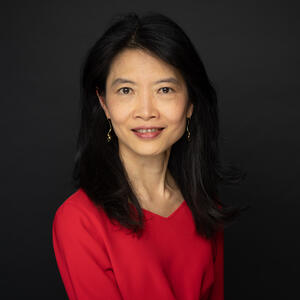Collection of personal information
Your personal information is collected under
the authority of section 33(c) of the Freedom of Information and Protection of Privacy Act. If
you have any questions about the collection or use of this information, please visit our
Access to Information page.
Carol Huang, MD PhD
PhD in Cell Biology, University of Toronto, The Hospital For Sick Children Research Institute, CanadaMD, University of Toronto, Canada

Areas of Research
Diabetes, Pancreatic beta cell growth and development
Pancreatic beta cells are the sole source of insulin, the hormone required for proper use of glucose. Any defect in production or utilization of insulin result in diabetes. Our lab is interested in understanding the molecular mechanisms that regulate beta cell mass and function. We use pregnancy as a physiologic model of increased insulin demand to understand how pancreatic beta cells adapt to stress. Using rodent models, we have found that intact prolactin receptor signalling is required for normal glucose homeostasis and beta cell mass expansion during pregnancy. In the absence of prolactin receptor signalling, the pregnant mice developed gestational diabetes, and the female offsprings born to diabetic mothers are also at increased risk of developing gestational diabetes themselves. This suggests that prolactin signaling regulates pancreatic beta-cell development, and it may contribute to fetal programming of pancreatic islets. Our current research focus is on 1) identification of novel signalling pathways that regulates β-cell function and survival during pregnancy, 2) identification of non-cell autonomous function of prolactin receptor in β-cell function, 3) mechanism underlying fetal programming of β-cells in the context of prenatal exposure to mild hyperglycemia. We use transgenic mice and cell lines as our model systems, using molecular biology, biochemistry, and in vivo physiologic testing techniques to address these questions.
Pancreatic beta cells are the sole source of insulin, the hormone required for proper use of glucose. Any defect in production or utilization of insulin result in diabetes. Our lab is interested in understanding the molecular mechanisms that regulate beta cell mass and function. We use pregnancy as a physiologic model of increased insulin demand to understand how pancreatic beta cells adapt to stress. Using rodent models, we have found that intact prolactin receptor signalling is required for normal glucose homeostasis and beta cell mass expansion during pregnancy. In the absence of prolactin receptor signalling, the pregnant mice developed gestational diabetes, and the female offsprings born to diabetic mothers are also at increased risk of developing gestational diabetes themselves. This suggests that prolactin signaling regulates pancreatic beta-cell development, and it may contribute to fetal programming of pancreatic islets. Our current research focus is on 1) identification of novel signalling pathways that regulates β-cell function and survival during pregnancy, 2) identification of non-cell autonomous function of prolactin receptor in β-cell function, 3) mechanism underlying fetal programming of β-cells in the context of prenatal exposure to mild hyperglycemia. We use transgenic mice and cell lines as our model systems, using molecular biology, biochemistry, and in vivo physiologic testing techniques to address these questions.
Supervising degrees
Biochemistry and Molecular Biology - Doctoral: Seeking Students
Biochemistry and Molecular Biology - Masters: Seeking Students
More information
Working with this supervisor
Masters Student (1) PhD Student (1) with experience in a molecular biology or biochemistry lab is an asset but not necessary.
Postdoctoral fellows with experience in molecular biology or biochemistry.
Contact this supervisor
Complete the following form if you are interested in working with this supervisor for your Graduate Program. All fields are required, unless indicated otherwise.
